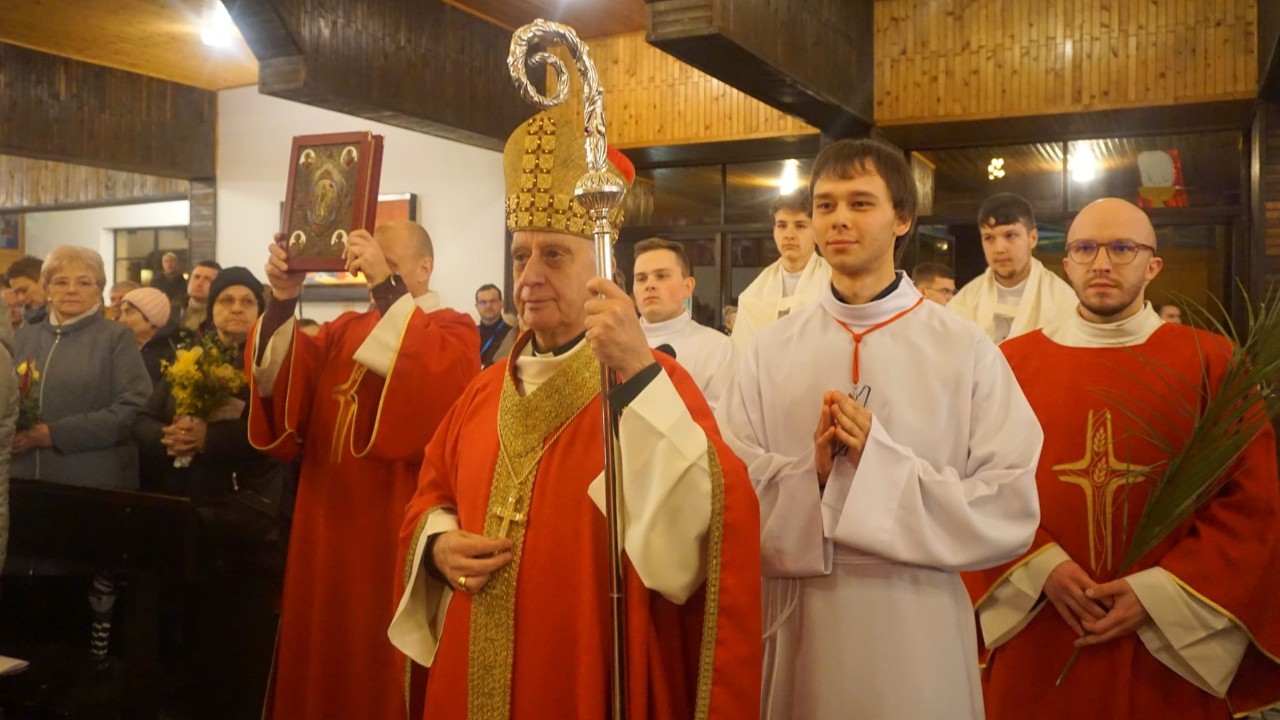Archbishop Fisichella inaugurates the Diocesan Eucharistic Congress in Gliwice, Poland

On Saturday 23 and Sunday 24 March 2024, in the Polish diocese of Gliwice, the Pro-Prefect of the Dicastery for Evangelization, Archbishop Rino Fisichella met with Communities of the New Evangelization and representatives of the Commission for the New Evangelization of the Polish Episcopal Conference, to mark the start of the diocesan Eucharistic Congress.
The two day celebration opened with a Mass celebrated by Archbishop Fisichella on Saturday afternoon in the Church of Our Lady of Częstochowa. “Evangelizing means expressing the love of the Father which is realized in the paschal mystery of his Son. Being living witnesses of this love leads us to meet everyone, no one excluded, to share with each one the joy of our encounter with the Risen Lord," said Archbishop Fisichella during the homily, addressing to the Communities of the New Evangelization of the Metropolis of Upper Silesia. “We must remember Saint John Paul II on his first visit to Krakow, when, in Nowa Huta, upon seeing the cross, he said: ‘The new evangelization must begin from here.’ You are the fruit of this prophecy and it is your responsibility to keep it alive.”
Opening the meeting with the leaders of the New Evangelization Communities that evening, the Pro-Prefect focused on the words of Saint Paul in the first Letter to the Corinthians: “I then proclaim to you, brothers, the Gospel which I announced to you and which you have received, in which you stand firm and by which you are saved, if you hold firm to it as I have announced to you." The apostle's text “can be taken as the true introduction to our reflections,” said the Archbishop.
He continued: “To the community of Corinth, Paul does nothing but transmit what he himself has received. There is no other alternative for faith. What we are called to believe means that we are responsible also for its transmission in a lively and dynamic way. This is the challenge of evangelization - it involves the ability to listen and the responsibility of announcing. The two go hand in hand."
Archbishop Fisichella then recalled that "we must return to what constitutes the center and foundation of our faith: the announcement of the resurrection", in a world that undergoes constant change.
“There are two elements that we keep coming back to as constant challenges: on the one hand, the mission of the Church to announce the Gospel and on the other, the persons who receive that announcement: our contemporaries. Forgetting one or other of these two components or limiting our focus to just one would lead to an imbalance that would actually compromise the mission of the believing community."
He went on to point out that in a time in which “not only behaviors are changing, but the very concept that is at the basis of our vision of man and therefore of all the anthropology that derives from it is changing”, evangelization must also become aware of “this cultural change that directly affects man's vision."
The true evangelizer, therefore, "is the one who knows how to grasp the signs of God's presence in history, where we all live, so as to be able to discern and transform the world in the light of the Gospel."
To the members of the New Evangelization Communities, the Pro-Prefect left two more important considerations: the Word of God as "a mirror in which we must look at ourselves to examine the
intensity of our commitment and the coherence of our actions," and prophecy as "a dimension proper to evangelizing action."
On Palm Sunday, Archbishop Fisichella met with the Commission for the New Evangelization of the Polish Bishops’ Conference and then presided over Mass in the Cathedral of Gliwice, with the bishop of the diocese, Bishop Slawomir Oder who then opened the Eucharistic Congress. Monsignor Oder welcomed the Pro-Prefect of the Dicastery, recalling the current Year of Prayer and the upcoming Jubilee of 2025.
Archbishop Fisichella dedicated his homily to a meditation on the Eucharist, which is "the presence of the Risen Christ in the midst of his Church", so that it might continue to be “an effective announcement of salvation for the world".
In the cenacle, on Holy Thursday "the mystery of the love of God is revealed. A mystery which cannot remain hidden, blackmailed by death, but which overcomes death with the strength of life which, through the power of the Father, brings about the resurrection of the Son."
This event is not relegated to the past, noted the Archbishop, but through the sacrament of the Eucharist it becomes present every day. The Eucharist, "testifies to the fact that Christ remains with us forever and loves us by offering the forgiveness of reconciliation and communion of life with the Father.” The gesture of "breaking the bread" reminds men and women that the Lord is present.
"This Eucharistic awareness,” concluded the Archbishop, “allows us to experience in a very particular way the closeness, the presence and our communion with the Lord Jesus, the true hope of those who believe in him."



